Midnight Plus One - Lyall Gavin (книги полностью бесплатно .TXT) 📗
Miss Jarman asked: 'Can I use the lights?'
I leant in through the window. 'No. But if I shout for lights, I want the headlights on full, undipped.'
'Is that a good idea?'
'If I don't think so, I won't shout.'
We crept on. The trees had no colour; just burned, black skeletons draped in tattered black robes. And you couldn't see five yards through them.
But nobody sets up gunfights among trees. Too narrow a field of fire, too dark, plenty of cover to jump behind… I remembered all that.
But did they?
I said: 'Push it along. Fast as you can.'
'I thought you said they'd wait until the very front,' she said.
'I still think so. I just got frightened.'
She may have laughed to herself, but we speeded up. She was winding the big, almost horizontal wheel from side to side; either she'd been seeing too many gangster movies, or the steering was very light and high-geared.
We cleared the trees, and the cringing feeling of waiting for a bullet passed.
Then, just past the edge of the forest, there was a low, long square shape: the first of the modern fortifications. I leaned in and said: 'Stop here for a moment.'
She let the car drift to a quiet stop. I walked across, and Harvey came up behind me. Without saying anything, we moved to either side as we closed up on the door of the blockhouse.
He asked quietly: 'What are we looking for?'
'Just studying the local architecture.'
He glanced at me, then nodded and started studying.
It was a very good blockhouse, if you happened to care about blockhouses, and the people who built this one had really cared. The walls at the loopholes were eighteen inches of solid concrete; the entrance was correctly cluttered with blast walls to keep out stray bullets or shell splinters; the loopholes were horizontal fan-shaped slits, wider at the outside. And the whole thing sunk several feet into the ground, so that only the top three or four feet showed.
It wasn't brand new any more. The camouflage paint had worn off, and the concrete had a damp and spongy feel, and came off in a gritty paste on your hands. But it was still eighteen inches thick.
Harvey ran a finger down the wall and said thoughtfully: 'Would have been a wonderful war.' Then he looked at me. 'You think the rest of it, up front, is like this?'
'Yes.'
'I'd been thinking of just holes in the ground, trenches. Like that.' He turned away. 'Would have been a wonderful war.'
After that, the fortifications came thicker and faster. An occasional pillbox in among a clump of trees; concrete platforms for guns; mortar pits gaping like open graves. The track got rougher, became just two ruts with small bushes and four-year-old trees sticking up between. The Rolls swept over them and scraped them to pieces on its underside.
I could have wished it any other colour but the one it was. In the drifts of moonlight the polished aluminium seemed to shine like a neon light.
The track flattened out on the valley floor. Half a mile away, up on our right, headlights flickered silently along the frontier road and stopped… Your papers please… just a routine check… Thank you very much, a good journey to you. A different world.
The car slowed. Harvey asked quietly: 'Is this it?'
I looked ahead – and it was.
It was a bank, about seven feet high, right across the valley. It had an even, unnatural look, like the slope at the end of a lawn. Then a flare of moonlight showed me more. It wasn't a bank, but a small plateau. The generals had decided that the higher the ground, the better fighting country it was – so they'd made it higher. The whole battle zone was set on a raised platform like a well-laid-out bowling green. It was all very logical, and all a little creepy.
The girl lifted her foot and the car stopped gently at the foot of the bank. An extra advantage of the platform was that it made the land just behind it dead ground – out of sight of an enemy in front. Or anyone waiting in the battle zone itself. That must have been planned, too.
Harvey and I stepped down and walked carefully up the slope and looked out across the battle zone.
At first all I could see was an unnaturally flat plain covered with a dark sea of short bushes, waving stiffly in the wind. Then I began to see the hard, square shapes underneath – blockhouses, pillboxes, command posts, mortar pits, and the zigzag of communication trenches.
It didn't look like a battle zone. It still had a squared-off neatness that was only slightly worn by thirty years of wind and rain and creeping grass. It looked like an old, lost city, abandoned and gradually sunk seven feet into the earth. But you could never wonder what sort of people had lived here. Nobody had lived.
But nobody had died, either. The clerks had typed out their little lists of Casualties to be expected – and the war had never come, nobody had fought, no casualties. Only the ghosts of men who had never died except on the clerks' typewriters.
Moonlight rippled over the zone and the concrete shapes turned a dim bluey-white like fresh damp bones.
Harvey said: 'It doesn't look good.'
I looked at him, wondering if he'd been thinking the same things. Then I realised what he meant. And it didn't look good. Out in the zone, you could hide an army. It had been built to do precisely that.
I said carefully: 'They'll be near the path. In this light, that means less than ten yards. So we get ourselves into the trench system and kind of creep up on them.'
He thought about it for what seemed like a long time. Then he shook his head. 'Sorry, Cane. If there's shooting coming, I've got to be with him.' He nodded at the car.
'You'll be doing a better job if you and me get the shooting done with before he gets near it.'
'Or maybe they jump us and he's sitting back here, naked. I can't do it, Cane.'
I said: 'We were hired to get him through. I'm going to do that.'
He shook his head again. 'No. You were hired to get him through; I was hired to keep him, alive. If I don't think he'll make it alive, my advice is he don't try.' He stared at me. 'Itold you at the beginning, Cane, this could happen. We'd end up wanting different things.'
'Maganhard'll want to try.'
'You could be surprised how people don't want to try things when I tell them it'll get them killed.'
I looked at him carefully. 'D'you want to call the whole thing off?'
He said quietly: 'Yes. I want to call it off.'
And then I knew. He was being honest – in the long, looping way that is the only way for a man like him to be honest about such things.
I said: 'Let's see what Maganhard says,' and turned back to the car.
Maganhard was already leaning out of the window. I couldn't see his expression, but I could guess. 'Well?' he crackled. 'What's the delay now?'
Harvey said carefully and tonelessly: 'The battle zone is very difficult ground, Mr Maganhard. It's built for exactly the job the other side's trying to do. I can't guarantee your safety if you go on. I advise you not to go.'
Maganhard's spectacles glinted dully as he turned to me: 'What d'you say, Cane?'
'I don't guarantee anything, either,' I said smoothly. 'I never did. But I'm ready to go. And in this light they're as likely to hit me as you.'
The flat metallic voice said: 'That sounds reasonable.' The spectacles glinted back at Harvey.
Harvey said doggedly: 'Cane and I are trying to do different jobs. He's trying-'
'He seems to be doing the job I want done,' Maganhard snapped. 'Why aren't you?'
There was a long, slow silence, with just the tickover of the Rolls like a tired heartbeat.
Then Harvey said: 'I've drunk too much, Mr Maganhard. There's no point in saying I'm sorry. But I'm slowed up. I'm not as good as I should be.'
It must have cost him blood to say that. No alcoholic ever admits it, and no gunman ever admits he might be beaten. And he had.


